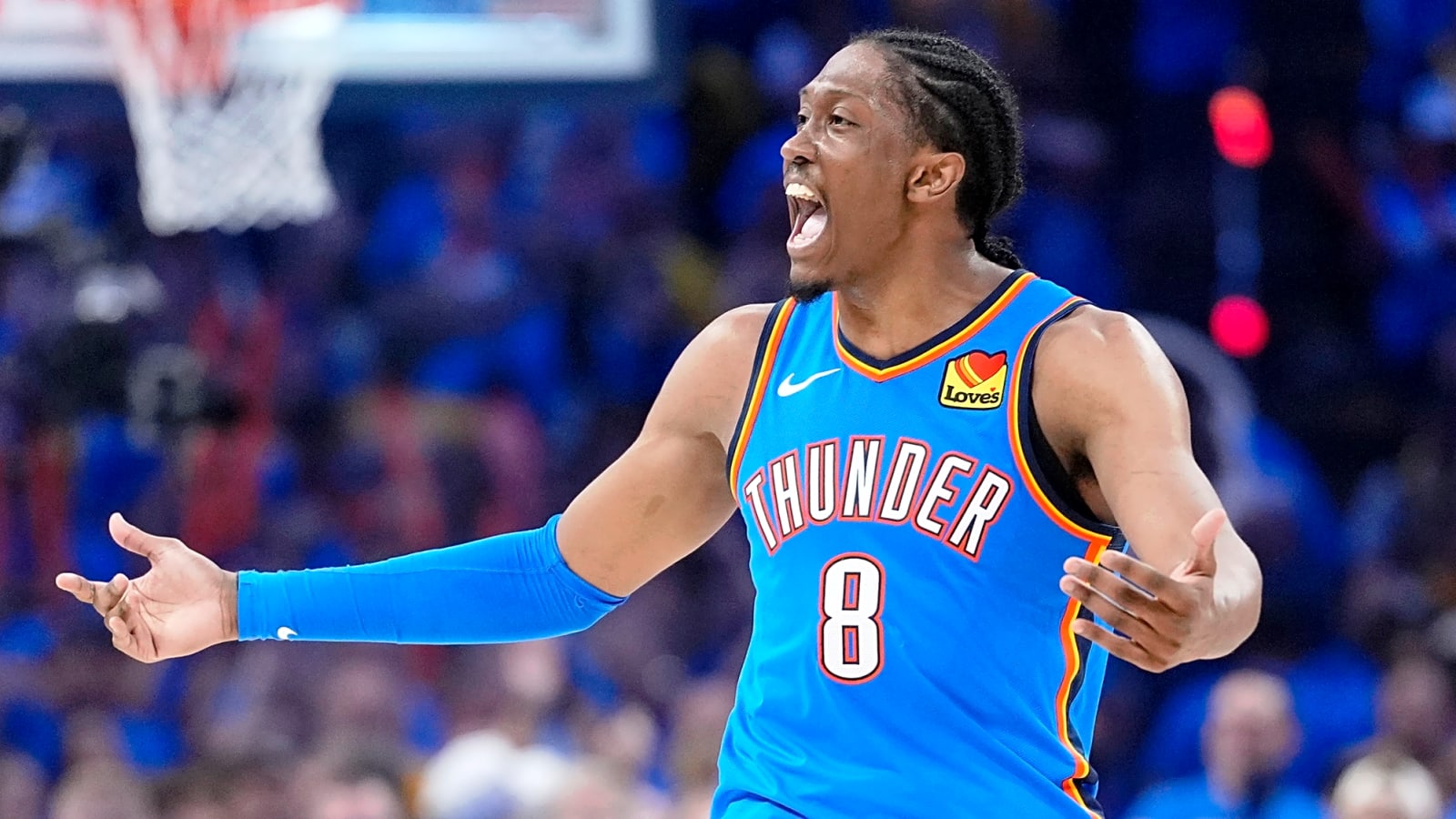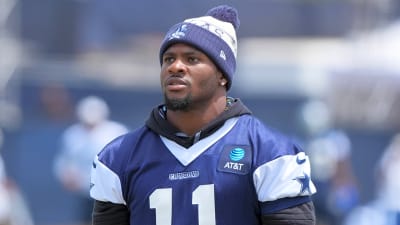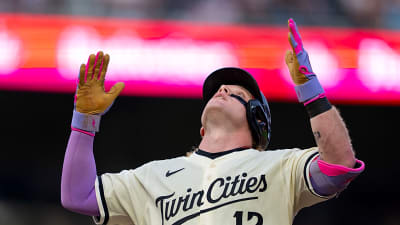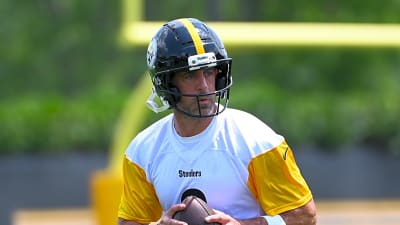
When the Oklahoma City Thunder hoisted the Larry O’Brien Trophy in June 2025, the best team in the world became known. Shai Gilgeous-Alexander blazed through the season as NBA MVP, scoring champion, Western Conference Finals MVP, and Finals MVP, an elite quadruple crown seen for the first time in league history.
Under head coach Mark Daigneault, OKC finished with a staggering 68-14 record, the best in franchise history, and dominated defensively behind Alex Caruso, Luguentz Dort, Chet Holmgren, Jalen Williams, and company.
But Houston has quietly transformed into a real threat. This offseason, the Houston Rockets swung for the fences, acquiring Kevin Durant, Dorian Finney-Smith, and Clint Capela in aggressive trades and signings.
They’ve kept core pieces, Fred VanVleet, Steven Adams, and Jabari Smith Jr., while maneuvering their roster near the luxury-tax apron in full “win-now” mode. The result: an elite starting five, plus defensive-minded role players and playoff seasoning under elite coaching.
Both franchises are on a collision course to meet in the Western Conference Finals. Thunder brings cohesion, youth, defensive depth, and a superstar carrying the load. The Rockets counter with high-octane scoring, frontcourt size, veteran toughness, and seamless fit. So who emerges if this series goes the distance?
Let’s predict a seven-game WCF preview, breaking down starting lineups, benches, coaches, and strengths of each team.
Starting Lineups
Oklahoma City Thunder: Shai Gilgeous-Alexander, Luguentz Dort, Jalen Williams, Chet Holmgren, Isaiah Hartenstein
Oklahoma City’s starting five is a picture-perfect blend of superstar excellence and defensive synergy, and we saw it throughout the playoffs last year. Shai Gilgeous-Alexander (MVP, Finals MVP, and scoring champ) takes over games with poise, whether it's scoring, playmaking, defense, or simply acting like a decoy.
Surround him with Luguentz Dort’s lockdown perimeter defense, Jalen Williams’ two-way versatility, Chet Holmgren’s rim-protection and shooting, and Hartenstein’s solid screen-and-roll presence, and you’ve got the most well-rounded starting unit in the West. The Thunder roll out five defenders who can switch, rotate, and close out at elite levels, and that cohesion defines their identity.
Houston Rockets: Fred VanVleet, Amen Thompson, Kevin Durant, Jabari Smith Jr, Alperen Sengun
Houston’s starting five feels like the high-stakes answer to OKC’s balance. Fred VanVleet brings playoff grit and a clutch touch, Amen Thompson adds freak-athleticism and playmaking upside, Kevin Durant still brings elite scoring from anywhere on the court, Jabari Smith Jr. offers length and emerging creation, and Alperen Sengun gives them a skilled, high-IQ interior anchor.
It’s a mix of veteran leadership and upside, headlined by Durant’s presence. This lineup can outscore you in a heartbeat, especially when Durant is feeling it and Sengun is dominating in paint-to-paint mode.
However, the slight edge goes to the Thunder. They have the most natural talent and the best player on the floor. In fact, one can argue that they also have the second-best player on the floor: Jaylin Williams. With so much star power on both sides, whoever has the better go-to players normally proves to be the difference over a long seven-game series.
Advantage: Oklahoma City Thunder
Key Bench Players
Oklahoma City Thunder: Alex Caruso, Isaiah Joe, Cason Wallace, Aaron Wiggins, Jaylin Williams, Kenrich Williams
OKC’s bench feels like a defensive and switchable wall with Alex Caruso leading the charge; his energy and closing instincts are playoff gold. Isaiah Joe and Aaron Wiggins keep the spacing sharp; Cason Wallace gives you perimeter steal ability and rotation flexibility; Kenrich Williams and Jaylin Williams (when healthy) man the forward minutes with hustle and effort.
It’s a bench built to tighten games, cut off lanes, and hand the ball back to SGA and Co. when the starters rest. A true two-way supporting cast that aligns perfectly with Daigneault’s defensive blueprint.
Houston Rockets: Reed Sheppard, Dorian Finney-Smith, Tari Eason, Josh Okogie, Clint Capela, Steven Adams
Houston’s second unit is rugged and ready. Dorian Finney-Smith brings switched perimeter defense and corner threes; Tari Eason provides energy and edge, often attacking late in games; Clint Capela returns as an enforcer inside; Steven Adams brings veteran toughness and size; Reed Sheppard is the young playmaker they hope to develop.
There’s grit, there’s length, and there’s defensive emphasis. If OKC’s bench is finesse and structure, Houston’s is muscle and chaos, an ideal blend to wear on opposing starters. That means it will be hard to provide an edge to either side, although we believe Houston's size could give them the slight edge.
Advantage: Houston Rockets
Mark Daigneault vs. Ime Udoka
Mark Daigneault deserves applause; his young core delivered the best regular-season record in franchise history (68-14), then turned the same roster into champions via seamless playoff navigation and adjustments. He’s learned to develop flexibility: whether running Jalen off-ball, deploying Holmgren for switching, or trusting his bench defensively.
Daigneault has built a process that doesn’t rely on X’s and O’s alone; it’s about culture, trust, and the next man up. We literally saw his growth over each series in the playoffs last season.
Ime Udoka is no slouch himself. Recognized as Coach of the Month during the regular season, he just signed a multi-year extension and heads up a deeply connected staff described as a “brotherhood” rooted in mentorship and cohesion.
His system emphasizes physicality, switching defense, and player empowerment, which we’ve seen in Houston’s second-half surge and the way his bench and starters mesh. It’s a scheme built for disruption and depth.
We value both coaches equally and think they can each be difference-makers, so we don't see either team having an edge. Daigneault has proven himself, but Udoka has brought toughness and physicality back to the NBA, and that throws teams off. We call it even.
Advantage: Even
Oklahoma City Thunder Advantages
First off, OKC owns unmatched versatility. With Dort, Caruso, Holmgren, and Wallace, they can switch across all four perimeter spots, protecting the paint and forcing opponents into low-probability looks.
They allowed the fewest paint points, turnovers, and fast-break buckets all season, and their rim protection, especially with Holmgren and Hartenstein, is elite.
Second, depth and structure. Their bench fits seamlessly into rotations without losing integrity. Caruso doesn’t just defend, he brings playoff IQ and closing reliability. Meanwhile, continuity and familiarity let them run sets crisply in clutch moments.
Opposing teams may struggle to exploit mismatches when OKC’s role players never deviate from the game plan. Not to mention, they have the NBA's MVP and one of the best sidekicks in the NBA.
Houston Rockets Advantages
Houston’s star power is undeniable. Kevin Durant remains one of the most lethal offensive weapons in the league; his ability to create off the dribble, shoot from distance, and exploit mismatches is playoff gold. When paired with efficient playmakers like VanVleet and Amen Thompson, they can go on scoring runs that flip momentum in a heartbeat.
Big-man rotation is another edge. Sengun's touch, passing, and post scoring create challenges down low; Capela offers bulldog interiors and offensive rebounding; and Adams brings championship toughness. That trio could dominate OKC’s interior if free space opens up.
It’s the sort of physicality that can clog passing lanes and control second-chance opportunities. If Durant can stay healthy, Houston doesn't really have a weakness, and the fact that he can be there to mentor Amen Thompson is very good news for the Rockets.
Who Wins In A Best-Of-7 Series?
The Houston Rockets are going to be a major threat next season and easily a top-3 team in the West in terms of talent and capability. However, we have to give the edge to the reigning NBA champions, who are likely positioned ahead of Houston and Denver in the West.
With Shai Gilgeous-Alexander at the peak of his powers and a proven playoff system already delivering a championship, OKC’s confidence and structure give them series-closing capability.
The Rockets’ gamble on Kevin Durant, plus key additions like Finney-Smith and Capela, vaulted them into serious title contention. Their incredible offseason could be the difference, moving into the top tier of title hope, highlighting how massively their outlook improved with marquee upgrades.
However, while the roster firepower is undeniable, they still rank just behind OKC in conference title hopes. Of course, anything can happen, including injuries or late-season surges from other teams, but the Thunder are locked in and ready for next season and, barring a championship hangover, are slightly ahead of the Rockets.
Prediction: Oklahoma City Thunder vs. Houston Rockets 4-3
More must-reads:
- Could Warriors actually get LeBron James before he retires?
- Gilbert Arenas arrested for for allegedly running illegal gambling business
- The 'NBA Summer League MVPs' quiz
Breaking News
Trending News
Customize Your Newsletter
 +
+
Get the latest news and rumors, customized to your favorite sports and teams. Emailed daily. Always free!








